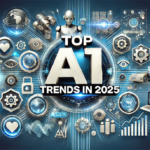Artificial Intelligence (AI) is no longer a futuristic concept — it’s a present-day reality shaping how businesses operate, how people live, and how the digital world functions. At the heart of this transformation lies the AI platform, a technology ecosystem that enables machines to perform cognitive functions such as learning, reasoning, and problem-solving.
In this article, we explore what AI platforms are, highlight leading providers, compare the top solutions available today, and discuss how these platforms are powering the future. Whether you’re a business owner, tech enthusiast, or simply curious about AI, this comprehensive guide will help you understand the landscape.
What Are AI Platforms?
An AI platform is a suite of tools and services that enable developers and businesses to build, train, test, and deploy AI models. These platforms combine machine learning (ML), natural language processing (NLP), computer vision, robotics, and more under a unified environment. Their purpose is to make AI development more accessible and scalable.
Most AI platforms offer:
Data processing tools: For cleaning, labeling, and managing large datasets.
Model training: To train AI models using neural networks or other ML techniques.
Model deployment: To integrate AI into software, devices, or cloud environments.
Monitoring and analytics: For tracking AI performance and behavior.
AI platforms can be cloud-based, on-premise, or hybrid. Leading tech giants have invested heavily in these systems to power services ranging from customer support bots to autonomous vehicles.
Why Are AI Platforms Important?
AI platforms democratize access to complex technologies. Before their emergence, only large enterprises with specialized teams could develop AI models. Now, thanks to platforms like ChatGPT, even small businesses and solo entrepreneurs can benefit from intelligent automation.
Some key benefits include:
Efficiency: Automate repetitive tasks like data entry or customer queries.
Insights: Analyze massive data sets to uncover trends and make decisions.
Cost reduction: Save on labor, processing time, and infrastructure.
Innovation: Develop intelligent apps that adapt and improve over time.
With AI platforms at the core, industries such as finance, healthcare, logistics, and education are undergoing massive digital transformations.
Which Platform Is Best for AI?
Choosing the best AI platform depends on your goals — whether you’re a startup needing a flexible model, an enterprise with high-security requirements, or an academic researcher working on deep learning. Here’s a rundown of top contenders in 2025:
1. OpenAI (ChatGPT Platform)
OpenAI’s ChatGPT remains a leading force in natural language processing. It powers advanced conversational agents and integrates seamlessly into customer service, marketing, education, and software development tools.
Strengths:
Conversational AI and language modeling.
Highly accessible via APIs.
Wide community support and plug-in ecosystem.
Limitations:
Primarily text-based (less support for vision/audio models).
Data privacy concerns in some industries.
Target Use Case: Chatbots, copywriting, support automation.
✅ Visit AI platform to explore applications of conversational AI in real-time environments.
2. Google Cloud AI
Google’s AI Platform provides powerful machine learning tools, TensorFlow integration, and access to Google’s vast infrastructure. It’s ideal for building custom ML pipelines, especially in big data environments.
Strengths:
Integration with TensorFlow and Vertex AI.
Scalable training and deployment.
Strong documentation and developer tools.
Limitations:
Can be costly for smaller businesses.
Complexity might require technical expertise.
Target Use Case: Custom model training, large-scale data analysis.
3. Microsoft Azure AI
Azure AI from Microsoft offers comprehensive tools for cognitive services, machine learning, and robotic process automation. With strong enterprise-level security and compliance, it’s a favorite among government and healthcare sectors.
Strengths:
Enterprise-ready with secure cloud.
Seamless integration with Microsoft products (e.g., Excel, Teams).
Pre-trained models and AutoML features.
Limitations:
Licensing and pricing can be complex.
Less intuitive for non-technical users.
Target Use Case: Enterprise AI applications, secure data environments.
4. Amazon Web Services (AWS) AI
AWS offers SageMaker, Rekognition, Lex, and other AI services tailored for deep learning and automation. It caters well to businesses seeking powerful, customizable tools.
Strengths:
Deep learning capabilities.
High-performance computing environments.
Vast library of AI services.
Limitations:
Requires understanding of AWS ecosystem.
Some services are over-engineered for small tasks.
Target Use Case: E-commerce, image/video analysis, virtual agents.
5. IBM Watson
Once a buzzword, IBM Watson has evolved into a reliable platform for AI-driven business intelligence and decision support. It’s widely used in healthcare, banking, and legal industries.
Strengths:
Excellent for data analysis and NLP.
Compliant with regulatory standards.
Hybrid cloud deployment.
Limitations:
Market perception as being “legacy” compared to newer players.
Smaller developer ecosystem.
Target Use Case: Data analytics, regulated industries, chatbots.
Is ChatGPT Still the Best AI?
When it comes to conversational AI, ChatGPT by OpenAI is still one of the most widely recognized and advanced platforms as of 2025. With the release of GPT-4 and GPT-5 variants, its ability to understand and generate human-like text has reached unprecedented levels.
Why ChatGPT Still Leads:
Constant updates and fine-tuning.
Multilingual and multimodal capabilities.
Widespread adoption in education, content marketing, and customer support.
However, it’s essential to understand that ChatGPT excels primarily in text generation and communication. For tasks like image recognition, real-time robotics, or industry-specific ML models, other platforms may offer better capabilities.
Explore how conversational AI is transforming user experience through quantucationx.com.
What Are the Big 5 in AI?
The Big 5 in AI refers to the major tech companies dominating artificial intelligence research, development, and deployment. They include:
1. Google (Alphabet)
Home to DeepMind and Google Brain, Alphabet is a pioneer in machine learning, natural language processing, and quantum computing.
2. Microsoft
Invested heavily in OpenAI, Microsoft integrates AI across its products and provides enterprise-grade tools through Azure AI.
3. Amazon
AWS is a dominant force in cloud-based AI, offering tools for deep learning, speech recognition, and computer vision.
4. Meta (Facebook)
Meta focuses on AI for social media, the metaverse, and advanced research in computer vision and generative models.
5. IBM
Known for Watson and its AI ethics leadership, IBM emphasizes transparency, security, and industry-specific AI.
These companies set trends, fund research, and shape how AI impacts everyday life. Their investments in AI platforms ensure constant evolution, giving users access to ever-improving tools.
AI Platform Use Cases in 2025
AI platforms are no longer limited to research labs or elite tech firms. Here are just a few ways businesses are using AI today:
Retail: Predict inventory needs and recommend products.
Healthcare: Diagnose conditions from medical images.
Banking: Detect fraud using pattern recognition.
Education: Customize learning paths based on student data.
Customer Support: Chatbots that understand intent and emotion.
These use cases continue to grow, thanks to platforms that lower the barrier to AI development and deployment.
Conclusion
Artificial Intelligence is shaping the future — and AI platforms are the engines driving this transformation. From powering simple chatbots to training billion-parameter models, the right platform makes the difference between experimentation and real-world impact.
Whether you’re a solo entrepreneur exploring ChatGPT or an enterprise evaluating Azure or AWS, understanding the landscape helps you choose the right tool for your needs.
To dive deeper into the AI revolution and explore solutions that can elevate your business, check out:
✅ AI platform

